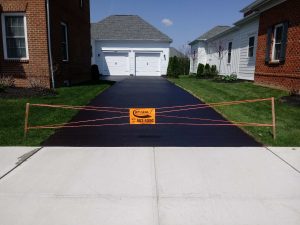
So, you’re thinking about sealcoating your asphalt driveway? I could start by recommending you have the work done by a trusted contractor but that’s not why you came here. You want the inside scoop on how to do it yourself. An asphalt driveway is an investment that is well worth protecting. Proper maintenance can triple the life of asphalt, saving you thousands of dollars while providing your property with curb appeal at the same time.
So, let’s get started:
1. Access Your Asphalt Driveway
Start by looking for trouble spots such as potholes, crumbling areas, cracks or fluid stains. Potholes are most often the result of pavement fatigue, caused by the natural process of aging. As water penetrates through the asphalt and into the stone base, problems develop. The freeze/ thaw cycle in central Ohio accelerates the development of potholes and cracks. The most important thing you can do to extend the life span of your asphalt driveway is to prevent water from penetrating though the asphalt and down into the stone base. Asphalt crack sealing and pothole repairs are an ongoing maintenance item. After a crack appears it will always come back. I suggest purchasing the best asphalt repair products available. Visit https://asphaltstore.com/ to find quality asphalt maintenance products, including driveway sealers.
2. Properly Prep Your Asphalt Driveway
Start by trimming the grass back from the edges of the driveway. If your driveway has cracks, remove any dirt or vegetation from the cracks. Use a leaf blower or broom to clean loose debris from the surface. Use a water hose to spray any remaining particles off the driveway. If you decide to use a pressure washer be careful. Too much water pressure can cause damage to any loose aggregate. Thoroughly clean fluid stains with a degreaser or Dawn dish soap and scrub with a stiff bristle brush. If you’re not confident that the stains have been completely removed, apply a specialty primer. Latex asphalt primers can be found at The Asphalt Store or your local hardware store. Take extra care to prep the driveway properly. The finished product will only be as good as the prep.
3. Repair Potholes
If your driveway’s cracks have developed into potholes, you need to repair those areas. Blacktop patch, also called cold patch should be used to repair potholes, deep depressions, and crumbled areas. Blacktop patch is essentially ready-to-use asphalt that comes in a bag. Potholes are most often the result of pavement fatigue, caused by the natural process of aging. Brush or vacuum the area clean, making sure to remove any pieces of loose asphalt. Cut open the bag and use a shovel to spread blacktop patch about 2 inches at a time across the hole. Compact the area with a hand tamper. Add more blacktop patch, if necessary, and compact the area again. Repeat this process until the hole is slightly overfilled. Compact the asphalt until it’s flush with the driveway. If the patch sinks below the surrounding surface, add more blacktop patch and repeat. Allow at least 24 hours for the blacktop patch to cure before applying the sealcoating.
4. Seal Cracks
As soon as new asphalt is installed ultraviolet rays from the sun start the oxidation process. Asphalt, also known as bitumen, is a black, highly viscous liquid or semi-solid obtained as a residue in petroleum refining. This product is mixed with aggregates, including sand to make asphalt cement. Asphalt cement is the product used for residential driveways, parking lots and roads. Oxidation causes the bitumen to break down, turning the surface from deep black to gray. If the pavement does not get sealcoated on a regular basis, the bitumen (asphalt) gets brittle and the aggregate starts to separate. This is called raveling. As the aggregate ravels a pathway for water to penetrate forms and combined with the freeze/ thaw cycle, cracking begins. This is the stage where water begins to attack the integrity of your asphalt pavement. Keeping these cracks sealed is the most important part of a comprehensive maintenance schedule that will prolong the life of your asphalt pavement. There are several choices for crack sealing material. Jet-Seal highly recommends a product that contains polymers. Some products are designed for smaller cracks such as caulking gun products or squeeze bottle material and others such as trowel grade materials are better for larger cracks. These types of products contain fillers such as recycled rubber and/ or sand. Some deeper cracks may first require a filler prior to using the crack sealant. Sand or foam backer rod are often used. Whatever you decide to use, leave at least a half inch between the top of the filler and the surface of the driveway. Cracks can go down as deep as the stone base. So, using a filler will keep the crack sealer from running down into the base. This will save on material and will result in a longer lasting repair. Fill the crack so that it is level with the surface. Crack sealing is labor intensive and time-consuming, but well worth the effort. Crack sealing material will often settle, requiring a second application to bring the product level to the surface. Make sure to allow the crack sealant to thoroughly cure before you begin the sealcoating process.
5. Sealcoating Your Driveway
Thoroughly mix the sealer using a paddle attachment on a drill. Turning the pails upside down overnight will help with the mixing process. Make sure to have all the material thoroughly mixed before you begin.
Check the forecast! Depending on the product you will need anywhere from several hours to several days of drying time. Most driveway sealer manufacturers recommend that temperatures be at least 50 degrees and rising and not fall below 50 degrees at night. There are two types of driveway sealers, Refined coal tar and asphalt emulsions. Coal tar products are a byproduct of the steel coking process. Asphalt emulsion products are a petroleum derivative. The ecological effects of refined coal tar are a topic of great debate in the industry. For more information visit, http://www.truthaboutcoaltar.com/ The difference in durability is vastly different. Refined coal tar products will protect against gasoline and oil spills whereas asphalt emulsion products will not. Refined coal tar products will also last much longer. Refined tar is typically used by professional contractors. You won’t find a refined tar product at Lowes or Home Depot. Expect to pay anywhere from $15 to $20 for a 5-gallon pail of a decent asphalt emulsion sealer that will cover 300 – 400 square feet, depending on the condition of the driveway.
Different products call for specific application instructions. For most products a squeegee/brush combination can be used to apply the product. A typical homeowner grade applicator sold in your local hardware or home improvement center will cost about $20. Start at the top of the driveway and pour out a liberal amount of sealer. Apply a coating 3’- 4’ down the edges. Using the brush side of the applicator work the sealer into any porous areas. Using the squeegee side, go from edge to edge, spreading the sealer thin but covering all areas. Take caution not to leave any excess material in low areas. Try to keep the squeegee marks as even as possible while repeating this method, working your way down the driveway. Wait 6 – 12 hours before applying a second coat, if necessary. Two thin coats are preferable to a single thicker coat. When you’re finished, make sure to install a barricade. Jet-Seal places a wooden stake on each side of the driveway and ties flagging tape across. This will help keep unwanted traffic off until the driveway is ready for traffic. Allow 48 hours before driving on it.
The biggest mistake homeowners make is over-sealing. Allow the sealer to wear off to the point where a small amount of the aggregate is bare. I would suggest two coats the first time the driveway is sealed and then a single coat every two to four years.
When you add the cost of materials, the applicator, your time and your ruined clothing, it is usually less expensive to have a professional do the work. Jet-Seal can purchase the materials in bulk and as I stated above, we have access to better quality materials. If you have any questions, please don’t hesitate to contact us at, https://jet-seal.com/contacts/. We will be happy to provide you with a free quote.
